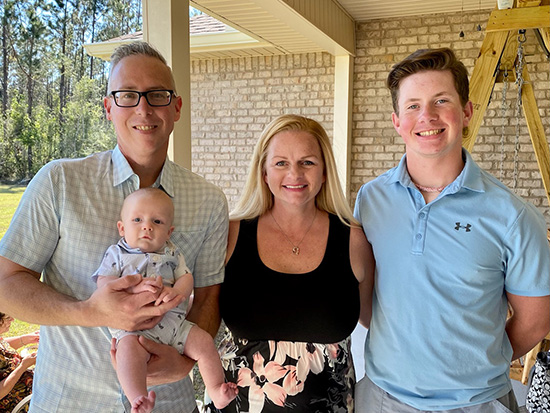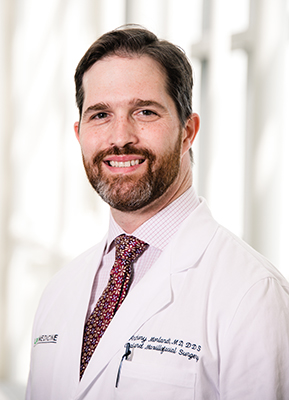Oral cancer survivor uses story to warn others about the dangers of oral cancer

(Photography: Matthew Snowden)
Four days after Matthew Snowden, 38, found out his wife was pregnant with their second child, he received some news he never thought he would hear — an oral cancer diagnosis.
Prior to his diagnosis, Snowden had what appeared to be an ulcer on the side of his tongue that was causing some discomfort. He had his wisdom teeth removed just a few months before the spot came up and assumed the discomfort was linked to that procedure. After a couple of visits to his local dentist, his pain would not go away, so his dentist decided to perform a biopsy. Just a few days later, Snowden was diagnosed with stage 2 squamous cell carcinoma and began exploring treatment options.
“When we were first told it was cancer, it really caught my wife and me off guard,” Snowden said. “My first thought was that my wife may have to raise our children alone. But on the other hand, this also gave me something to fight for. I really wanted to be able to hold our son when he was born, so it motivated me to do whatever I needed to do to get better.”
Snowden was referred to UAB Medicine’s Head and Neck Oncology Program. This program is made up of a team of specialists including surgeons, radiation oncologists, medical oncologists, pathologists, radiologists, dentists, prosthodontists, speech pathologists, nurses and nutritionists.
Snowden was treated by Anthony Morlandt, M.D., DDS, an associate professor in the University of Alabama at Birmingham Department of Oral and Maxillofacial Surgery. Morlandt performed the surgery and removed all the tumor and reconstructed the missing tongue tissue to restore its function. After the surgery, Snowden opted to undergo radiation as a precaution to ensure the cancer would not come back.
After 36 days of radiation, months of physical therapy appointments and some time spent on improving his speech, Snowden completed his recovery and was able to hold his son on the day he was born. Today he is a proud husband and father to his 16-year-old son and 1-year-old son. He has made it his mission to use his story to make others aware of the dangers of oral cancer.
“Something that a lot of people do not realize is that oral cancer affects everything,” Snowden said. “It not only affects your mouth and the way you eat and talk; but because of where the tumor is located, it also affects the muscles in your neck, shoulders and arms.”
Snowden had a perineural tumor, meaning it traveled along the nerves. Mouth cancers, like other cancers in the body, tend to favor nerves and travel by way of the lymph nodes and metastasize in the neck. After his procedure, Snowden attended physical therapy appointments to regain mobility in his arms, shoulders and neck.
Learn more about UAB Medicine’s Oral Oncology Clinic on UAB MedCast.
Snowden encourages people to take their dental hygiene very seriously and maintain routine dental checkups.
“Get your dental checkups, and pay attention to any problems or spots that develop in your mouth,” Snowden said. “When I first noticed the ulcer in my mouth, I thought it was all in my head, and if I had not gone in for a checkup, I could have waited until it was too late.”
Oral Cancer Prevention and Treatment
Oral cancer is the most common type of head and neck cancer in the United States. According to the Alabama Department of Public Health, Alabama ranks fifth in the United States for oral cavity and pharynx cancer incidence and seventh among the states for oral cavity and pharynx cancer deaths. Head and neck cancer can present in the nasal cavity, sinuses, lips, mouth, salivary glands, throat and larynx.
Just as in Snowden’s case, Morlandt warns that oral cancer will often masquerade as typical dental diseases such as gum diseases, ulcers, or red and white patches. Unlike other cancers that can be detected with screening tests, oral cancer can only be detected by a health care provider examining the mouth and referring the patient to a surgeon to perform a biopsy.

(Photography: Steve Wood)
“Patients like Matthew are becoming more and more common over time,” Morlandt said. “These patients are younger with fewer risk factors and, in many cases, will present with advanced disease. The fastest-growing group that we are seeing is Caucasian females ages 25-35 who have very few risk factors.”
Morlandt says some of the best ways to help prevent oral cancer are to avoid excessive alcohol and tobacco and maintain routine dental visits.
“About 75 percent of patients with mouth cancer are initially seen by their dentist,” Morlandt said. “Early detection of oral cancer can be the cure. If patients are experiencing spots in the mouth or lumps in the neck, they need to talk to their dentist or primary care provider. I cannot overstate the importance of the role that both dentists and primary care providers play in identifying these tumors.”
In addition to lumps or sores that do not go away, other oral cancer symptoms include swelling of the jaw, chronic sore throat, difficulty swallowing, hoarseness or change in the voice, and unusual bleeding, pain or numbness in the head and neck. If a patient is experiencing any of these symptoms, dentists and primary care providers can examine the mouth and refer patients to an oral cancer surgeon to do a biopsy if needed. If a patient’s biopsy detects cancer, an oral surgeon will work with them to develop a treatment plan.
“An oral cancer diagnosis can be devastating to a person’s quality of life,” Morlandt said. “At UAB Medicine’s Oral Oncology Clinic, our patients will work with multiple specialists who can meet all their oral cancer needs in one place. This does wonders for our patients and helps ease some of the burdens that come with this diagnosis.”
UAB Head and Neck Oncology is part of the UAB O’Neal Comprehensive Cancer Center, one of the original eight centers in the United States designated by the National Cancer Institute. When patients are treated at an NCI-designated comprehensive cancer center, they benefit from access to the latest therapies, cutting-edge clinical trials and the expertise needed to treat their cancer. Because cancer care often involves multiple types of treatment delivered by various specialists at UAB and regionally, the O’Neal Comprehensive Cancer Center works to assist patients each step of the way by providing team-based care, as well as education, resources, scheduling assistance, and contact information for questions or concerns that may arise during or after treatment.
“We realize that a cancer diagnosis is life-changing, and we admire the bravery and courage of each of our patients,” Morlandt said. “It is an honor to be able to care for them and walk alongside them during this difficult process.”




